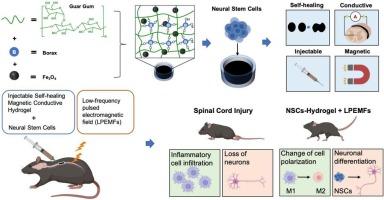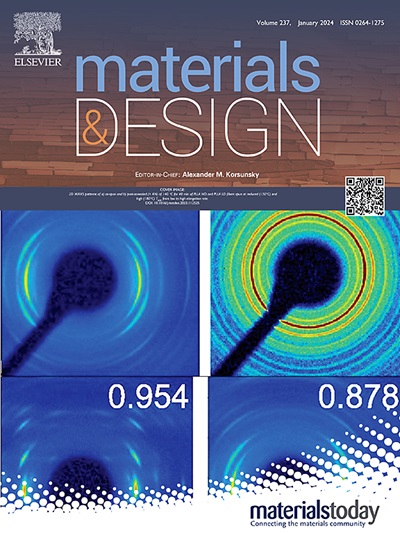Multifunctional conductive stem cell delivery hydrogel combined with low-frequency pulsed electromagnetic fields for spinal cord injury repair
IF 7.6
2区 材料科学
Q1 MATERIALS SCIENCE, MULTIDISCIPLINARY
引用次数: 0
Abstract
Spinal cord injury (SCI) is a severe traumatic disease for which no satisfying treatment is available. The severe inflammatory reactions and poor endogenous regenerative capacity cause difficulty in functional recovery. Neural stem cells (NSCs) transplantation is currently a promising treatment for repairing SCI. However, there is a lack of effective ways to improve the survival rates of NSCs and promote the neuron differentiation rates of NSCs. Conductive hydrogel can mimic environment which is suitable for neurodevelopment. Low-frequency pulsed electromagnetic fields (LPEMFs) have the advantages of safety, non invasiveness, and tissue repair, making it a potential method of repairing SCI. In this study, an injectable, self-healing magnetic, and conductive hydrogel was synthesized to carry out NSCs with LPEMFs for repairing SCI. In vitro experiments, under the treatment of LPEMFs and conductive hydrogel, the microglia tend to polarize into M2 phenotype, rather than M1 phenotype. Meanwhile, NSCs tend to differentiate into neuronal direction. In SCI model, conductive hydrogel loaded with NSCs combined with LPEMFs can promote functional recovery, through reducing inflammation and promoting neuron differentiation of NSCs. This study provides a novel NSCs transplantation strategy combined with physical interventions for SCI treatment, which brings a new desire to repair SCI.

多功能传导性干细胞输送水凝胶与低频脉冲电磁场相结合用于脊髓损伤修复
脊髓损伤(SCI)是一种严重的创伤性疾病,目前尚无令人满意的治疗方法。严重的炎症反应和较差的内源性再生能力导致功能难以恢复。神经干细胞(NSCs)移植是目前修复 SCI 的一种很有前景的治疗方法。然而,目前还缺乏提高神经干细胞存活率和促进神经元分化率的有效方法。导电水凝胶可以模拟适合神经发育的环境。低频脉冲电磁场(LPEMFs)具有安全、无创、组织修复等优点,是一种潜在的 SCI 修复方法。本研究合成了一种可注射、自愈合的磁性导电水凝胶,利用低频脉冲电磁场修复 SCI。在体外实验中,在LPEMFs和导电水凝胶的处理下,小胶质细胞倾向于极化为M2表型,而不是M1表型。同时,NSCs趋向于向神经元方向分化。在 SCI 模型中,装载有 NSCs 的导电水凝胶结合 LPEMFs 可通过减少炎症和促进 NSCs 的神经元分化来促进功能恢复。这项研究提供了一种结合物理干预治疗 SCI 的新型 NSCs 移植策略,为修复 SCI 带来了新的希望。
本文章由计算机程序翻译,如有差异,请以英文原文为准。
求助全文
约1分钟内获得全文
求助全文
来源期刊

Materials & Design
Engineering-Mechanical Engineering
CiteScore
14.30
自引率
7.10%
发文量
1028
审稿时长
85 days
期刊介绍:
Materials and Design is a multi-disciplinary journal that publishes original research reports, review articles, and express communications. The journal focuses on studying the structure and properties of inorganic and organic materials, advancements in synthesis, processing, characterization, and testing, the design of materials and engineering systems, and their applications in technology. It aims to bring together various aspects of materials science, engineering, physics, and chemistry.
The journal explores themes ranging from materials to design and aims to reveal the connections between natural and artificial materials, as well as experiment and modeling. Manuscripts submitted to Materials and Design should contain elements of discovery and surprise, as they often contribute new insights into the architecture and function of matter.
 求助内容:
求助内容: 应助结果提醒方式:
应助结果提醒方式:


